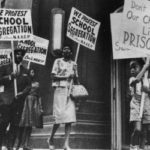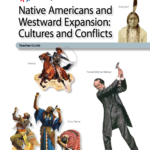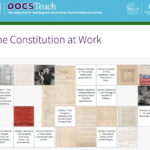A lesson plan for one 80-minute class at the AP level. In it students will identify the main steps in the process of creating and passing legislation:
-Explain the significance of party control and committee work in the Congress in the legislative process
-Identify the role that Congressional leaders such as the House of Representatives and the Senate Majority Leader play in the process of agenda-setting
-Identify the role the President plays in the law-making process
-Explain the reasons why the Founders intended the law-making process to be difficult
Constitutional Index – Treaty Making Clause
The Constitutional Index breaks down the U.S. Constitution by Section, Amendment, and Clause and contains broader topics and themes. These are used to cross-reference Library resources in an effort to annotate constitutional history.
Birth of American Democracy: Discourse, Debate and Compromise
In this exploration of American democracy students will follow the path to representative government by analyzing the tradition of discourse, debate, and compromise from Jamestown to Williamsburg and Philadelphia and finally to Washington. Students will determine the importance of debate and compromise for the development of a government by and for the people and also identify strategies for making their voices heard in government today. Free registration required to access lesson plan.
Local Politics: The Need for Compromise
This lesson examines the process of local decision making and its need for citizen input and compromise. Students simulate a local city/county council session and advise the council on public policy. Students are asked to consider the viewpoints of different citizen groups in order to reach a compromise that will benefit the entire community. This lesson can be used with a unit on local politics and can be adapted to reflect issues of compromise in your school or community. Free registration required to access the lesson plan.
The Power of One Decision: Brown v. Board of Education

When minority students decided to take their challenge of the “separate but equal” doctrine to the Supreme Court, the 1954 decision handed down by the court in Brown v. Board of Education and enforced by the executive branch, changed their lives and America forever. In this lesson plan, based on the Annenberg Classroom video “A Conversation on the Constitution: Brown v. Board of Education,” students gain insight into decision-making at the Supreme Court, learn about the people behind the case, construct a persuasive argument, and evaluate the significance of Brown v. Board of Education.
Teen Curfew
In this lesson, students will consider a proposed teen curfew law in a mock city council session. The class is divided into groups; one group is the city council, and the others represent the interests of groups of citizens – merchants association, county school board, etc. This exercise helps show students how citizens can be involved in policy change and decision making.
Native Americans: Cultures and Conflicts (CKHG Unit)

Across 7 lessons, this unit explores the ways of life of diverse Native American peoples and how their cultures were disrupted, displaced, and profoundly altered by westward expansion and American government policies and practices in the 1800s. Some of the content of this unit is tied to the “Pathway to Citizenship,” an array of civics-focused knowledge, questions, and activities.
Grade 9-12 Executive Branch Document Exploration
The purpose of this lesson is to assist student exploration of several of the primary source documents related to the creation of the executive branch. Through independent reading followed by a round robin assignment and an essay to explore current application of executive power, students will develop their historical inquiry skills and understand the scope and meaning of executive power under the U.S. Constitution.
Grade 6-8 An Energetic Executive
The purpose of this lesson is to assist student understanding of the expressed and implied powers of the president. By the conclusion of this lesson, students will understand the scope and purpose of these powers and be able to describe how they play out in real life. Students will also understand the importance of constitutional checks on presidential powers–examining the ways that a president could abuse his or her power should constitutional checks not exist.
